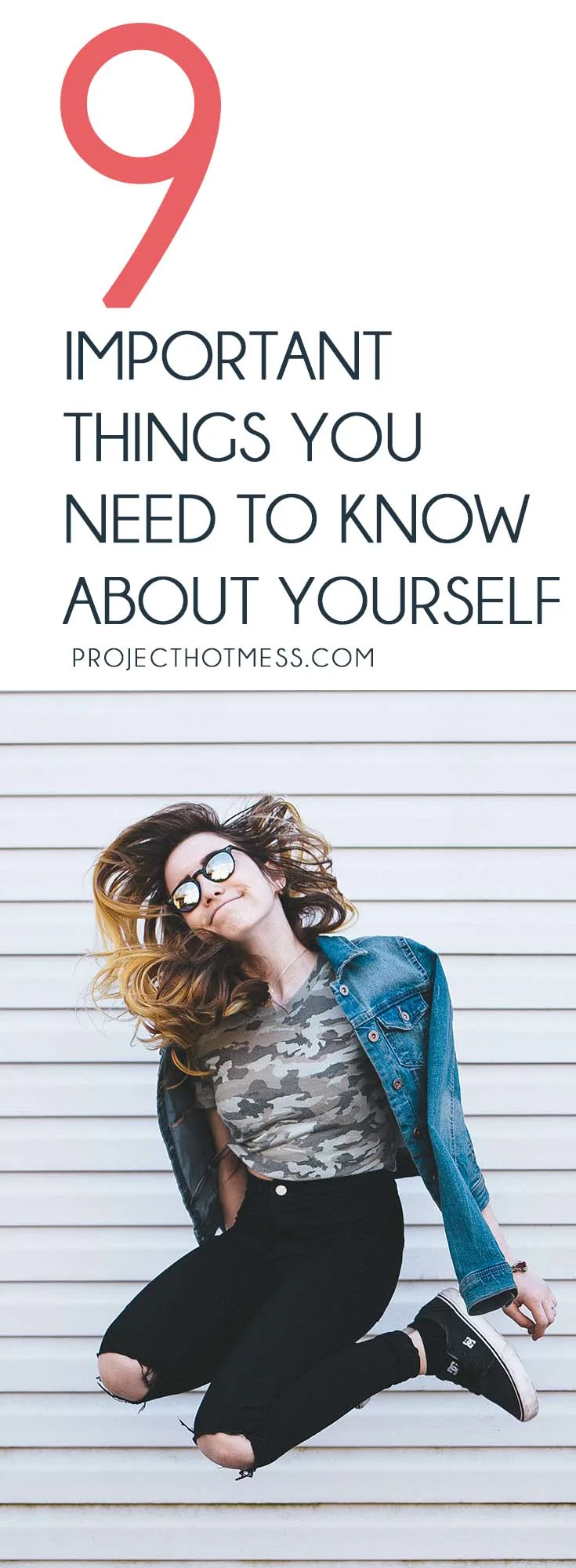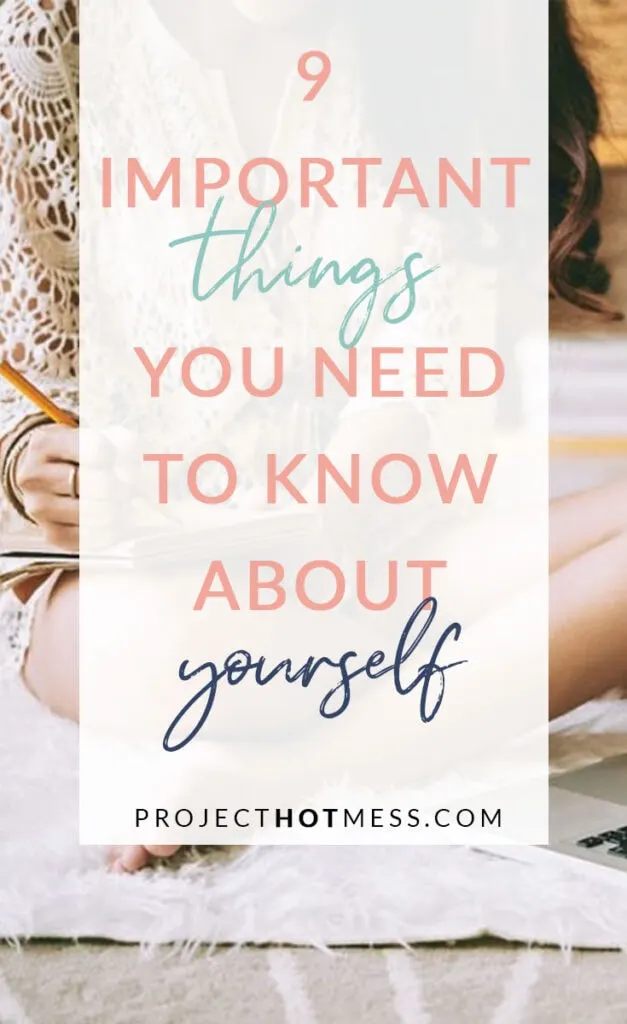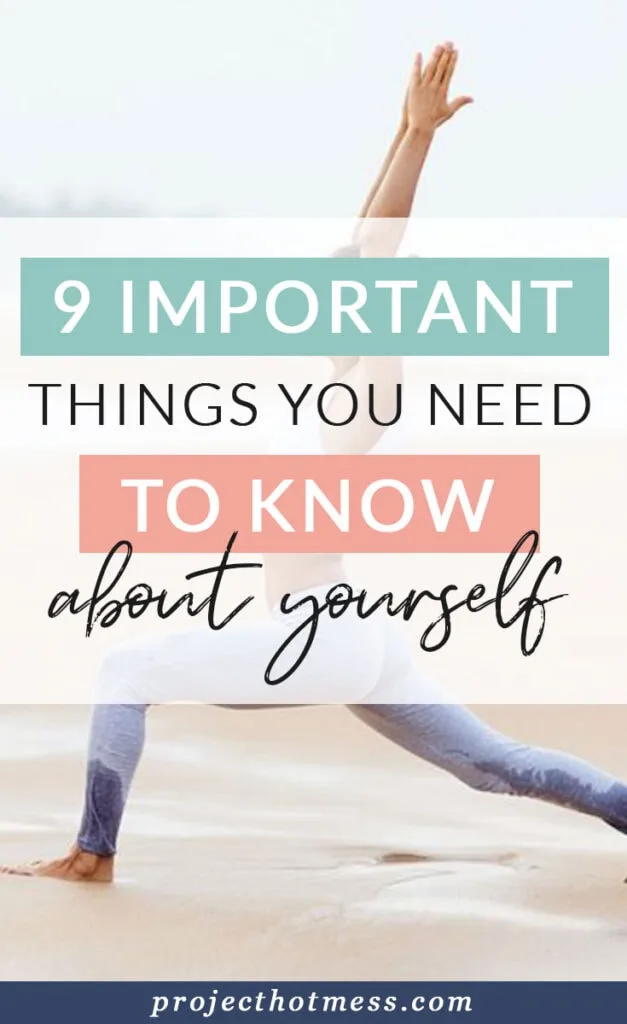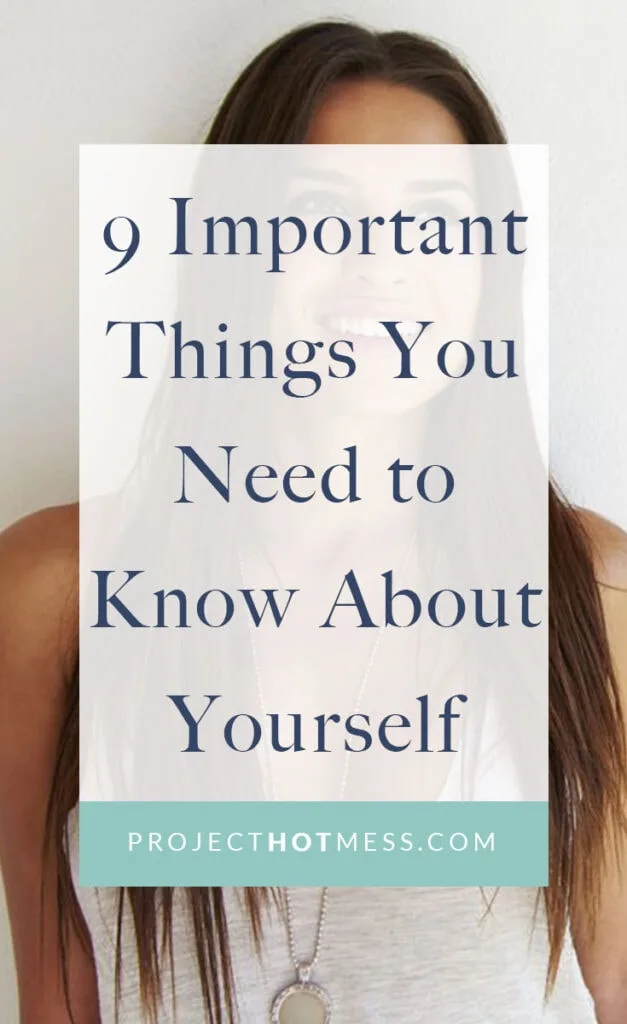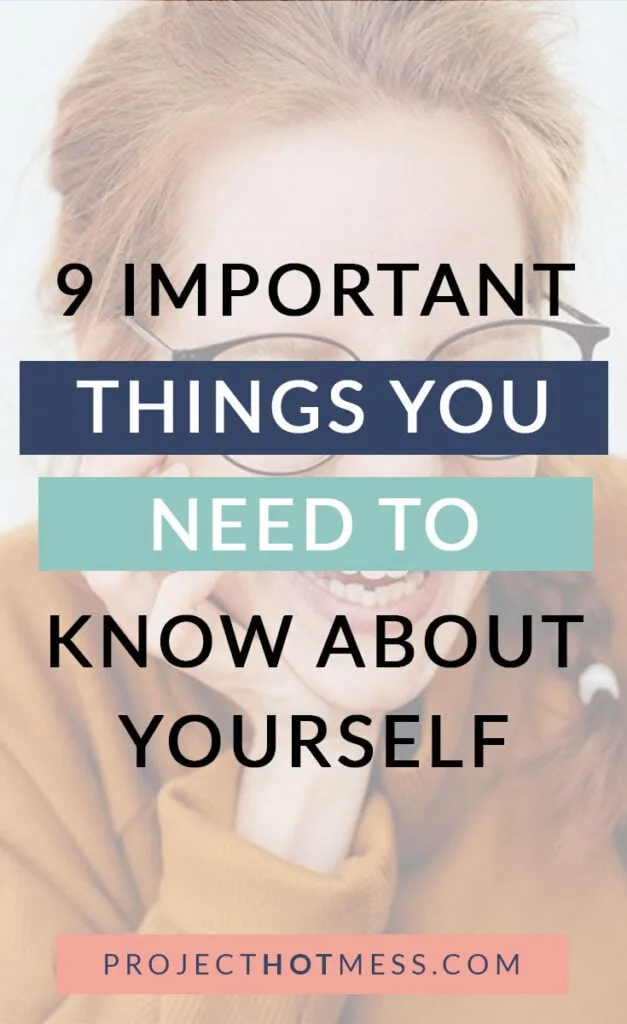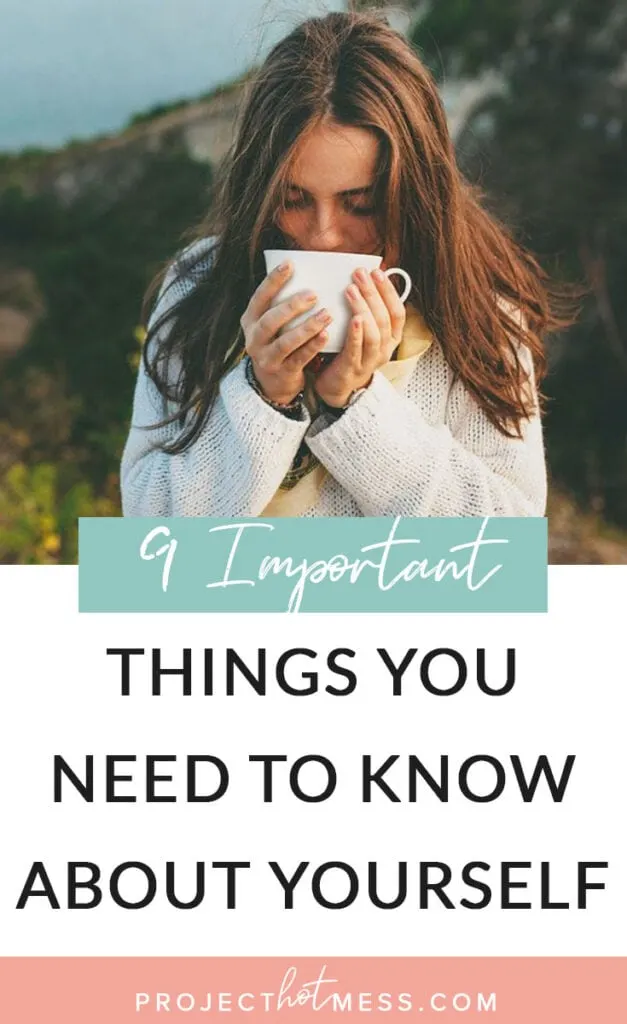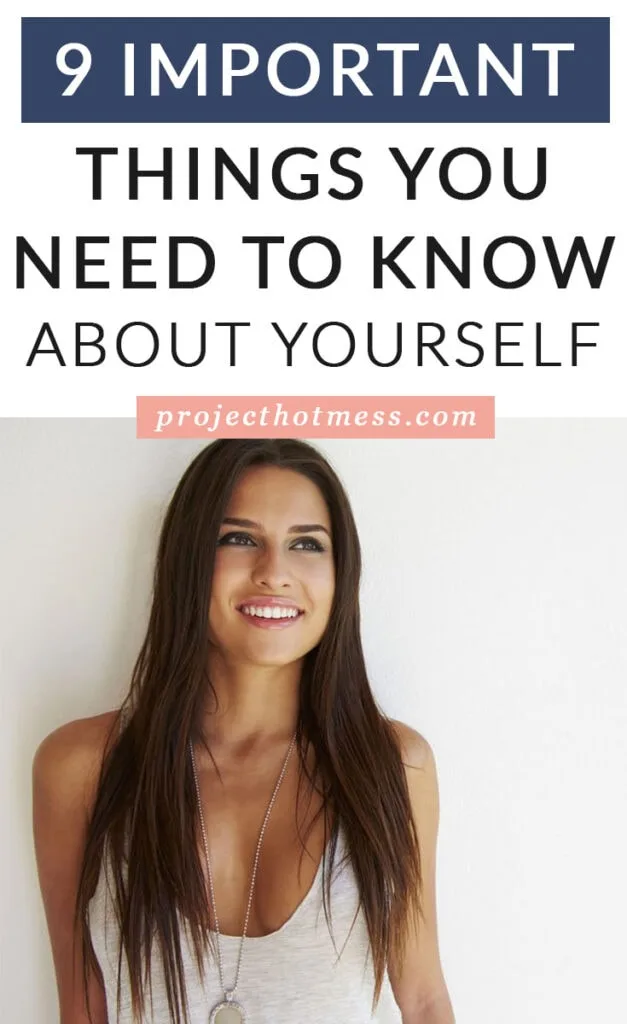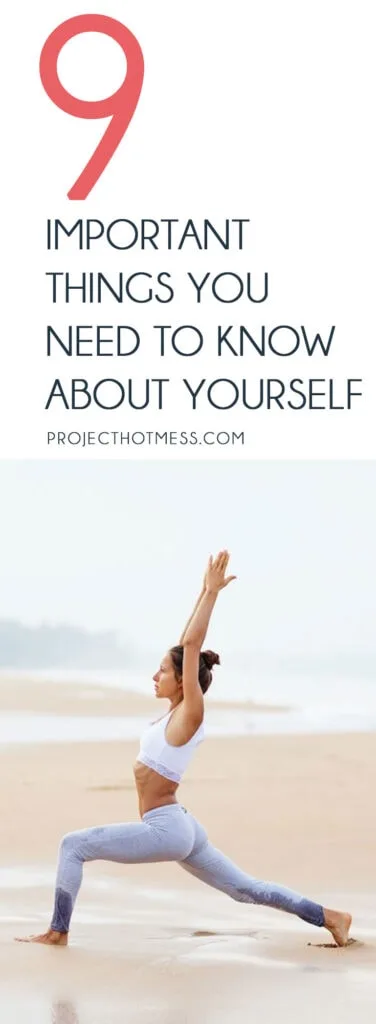How well do you know yourself? Like really?
We should be the ones that know ourselves the best but we often find it’s our loved ones that are telling us aspects of our personality we didn’t even realize ourselves.
Self-reflection is a huge part of personal development, and there are certain things you need to know about yourself.
While there are so many things to learn about yourself, there are a few basic questions you can ask that will help you find out how much you know about yourself (and what areas you might like to spend a bit more time exploring).
Do you know all of these? If not, now might be the perfect time to start thinking about them and getting to know yourself a little better.

1 – What Makes You Happy
If someone asked you the question ‘what makes you happy?’ how would you answer it?
Do you know a list of things you can do to pull yourself out of a rut?
Things you can do to brighten your day when you’re not feeling spectacular?
We often go through our days without actually consciously thinking about our happiness.
We think happiness is this big end goal that we are always working our way towards but we fail to notice the moments in our days that make us happy.
It may be something as simple as a walk on the beach, a freshly brewed pot of tea or escaping to your favorite cafe for coffee and cake while reading a magazine.
These things also form the basis for what you can do for self-care as well.
Knowing what makes you happy is one of the most important things you should know about yourself, and should reflect on regularly as it often changes as we move through life.

2 – What Are Your ‘Non-Negotiables’ in Relationships and Friendships
Knowing your ‘non-negotiables’ can save you a whole lot of time spent in relationships and friendships that you don’t like and aren’t serving a purpose in your life.
Your non-negotiables are both positive, as in the things you must have in relationships and deal breakers, as in the things that will make you run a mile.
For example, you might have a high work ethic, and value people who are hardworking and dedicated to their careers.
If you start dating someone who keeps quitting their jobs and has more days at home watching Netflix than they do doing anything productive, this may be a deal breaking non-negotiable.
Knowing your own values, what you want in a relationship and the kinds of people you want to surround yourself with can help in working our your non-negotiables for relationships and friendships.

3 – How You Respond To Stress
What’s your go to stress response?
Do you hide under a blanket and escape with a book, dive into a bucket of Ben and Jerry’s, escape to the beach for the day or become super organised and plan everything?
Knowing how you respond to stress can help you both identify highly stressful situations, create healthier stress coping habits and help you keep calm and cope better with stressful situations.
While there are ‘unhealthy’ ways to cope with stress, this is simply about knowing what your go to response is.
It’s important to know, and when you understand it yourself, you can even discuss it with loved ones so they too understand how you deal with these situations.

4 – Any Medical Conditions Or Issues
As a Paramedic this is a big one for me.
I am always surprised by the number of patients we go to that have no idea about their medical conditions.
They don’t know why they are on certain medications or even why they had certain surgeries or procedures.
It’s alarming and to be perfectly honest, it’s irresponsible.
It’s not up to your doctor to tell you everything you need to know, it’s up to you to ask questions.
Don’t just nod and agree, ask ‘why am I taking this?’ and ‘what do you mean by that?’
It’s also a good idea to start asking your family questions about medical histories.
With so many medical conditions being hereditary (and often not showing up until later in life) it’s important to know what you might be more susceptible to, and therefore what you can work on to avoid heading down the same path.

5 – What Kind Of Person You Want To Be
Is the kind of person you are now the same as the kind of person you want to be?
Who do you aspire to be more like? And what are you doing to make it happen?
I received a handwritten postcard from someone I admire one day and it totally blew me away.
I had reached out to her with a personal story about a situation we had both had similar experiences with. It was more for my own therapeutic benefit than anything else.
A few months later I received a handwritten postcard. This was from a woman who ran a multi-million dollar business, had a massive fan base and had a family of her own.
She didn’t have to take the time out to personally acknowledge me, but she did.
I now keep that postcard in my office as a reminder of the kind of person I want to be.
Someone who always takes the time to respond to the people who take time out of their lives to reach out to me. I’m not always fantastic at it, but that postcard serves as a reminder.
YOU MIGHT ALSO LIKE: 100+ Ultimate List Of Daily Habits To Improve Your Life

6 – Your Personality Type
Have you ever taken a Myers-Briggs personality test? It is one of the most insightful things you can possibly do.
I was never one to believe in things like this and was always the biggest sceptic but then I took a personality test as part of a job I had and it was like a light bulb switched on.
Since then I’ve researched heaps of different kinds and love the Myers-Briggs by far.
It’s simple and crazy accurate – I’m an ENFJ through and through.
So how does this benefit you?
Knowing your personality type is kind of like having permission to be who you are, unapologetically. For example, my inability to make a decision is part of my personality.
Although I do find it amusing that I can make a life-saving decision for a patient within seconds but I can’t decide on what I want to have for lunch.
Knowing your personality type can give you a much deeper understanding of who you are and why you are the way you are. Very interesting.

7 – Your Strengths and What You’re Good At
Keeping in line with knowing your personality, it’s also important to know what you’re good at.
These are things you should be darn proud of and excited to say that you are good at.
For example, writing is a strength of mine, I can write creatively, scientifically, I can write clearly and comprehensively and I can do so quickly.
A skill I used to great length at University when I was told I couldn’t write the 8,000 word assessment piece the night before it was due.
Challenge accepted. (I did it and I got 80%, pretty happy with that.)
I am also good at bringing people together, making people feel included and building others up. These are all skills I have put to use in creating Project Hot Mess.
What skills do you have? What are your strengths? Own them and be proud of them.

8 – Your Weaknesses and What You’re Not So Good At
Have you ever been to a job interview and they ask ‘so what are your weaknesses?’ and the standard response is ‘my weakness is that I work too hard’.
Urgh. No. Have more insight than that.
You need to know your legitimate weaknesses.
It will give you so much relief when you can accept that you’re just not so good at something and you don’t have to be good at everything.
This is a lesson I learned in business because it’s okay to have weaknesses.
These are the first things I outsource.
While I can do certain amounts of graphic design, it takes me hours and hours to complete a simple task. So I outsourced it.
Maybe you’re really bad at cooking like can’t boil an egg kind of bad. That’s okay. You can outsource that too (or at the very least buy pre-made healthy meals to get you through).

9 – Your Goals
Where do you see yourself in a few years time? Do you think about what you’re working towards?
Your goals aren’t just for your immediate future, and they aren’t just for your long range outlook.
They all need to work together in order to actually achieve anything.
Sure, your goal might be to buy a house by the time you’re 30 years old.
But if that’s where you leave it then you significantly decrease your chances of achieving it.
Whereas if you add in a goal to have x amount of money saved each week, and to do that you need to work x amount of overtime or get x kind of job or even a mini goal of just sticking to your budget for a month… these are all goals that work together to help you achieve a larger goal.
How did you go? How many of these things do you know about yourself?
